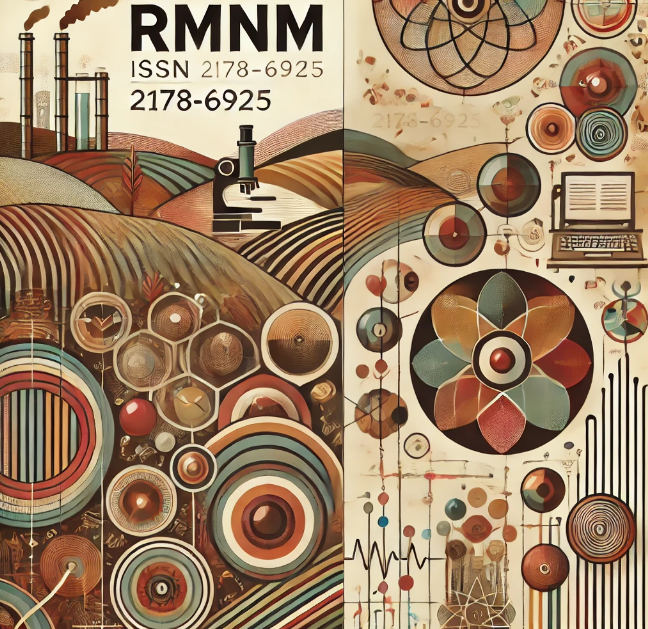O ENSINO DE MATEMÁTICA DIANTE DO CONTEXTO DE PANDEMIA
DOI:
https://doi.org/10.61164/rmnm.v6i1.2584Keywords:
Ensino de Matemática; Anos Iniciais; Aulas Remotas.Abstract
The general objective of this work is to analyze Mathematics Teaching in Early Childhood Education in remote classes, since we are experiencing a very adverse scenario, due to the social isolation caused by the Covid-19 Pandemic. From a contribution perspective, our specific objectives are to identify the challenges that teachers face in remote teaching; describe teaching with the additive field and problem solving. As a theoretical basis, our authors are Guerios; Agranionih; Zímer (2014), Muñiz (2001), Nacarato; Mengali; Passos (2015), Nunes et al. (2005), Passos e Souza (2015), among others. Studies were carried out on curricular documents such as the National Curricular Parameters in Mathematics (1997), the National Pact for Literacy at the Correct Age (2014) and the National Common Curricular Base (2017). The methodology had a qualitative approach, seeking to describe and analyze the elements that make up Mathematics Teaching in Early Childhood. Data collection was carried out using a semi-structured questionnaire containing 14 questions, applied to teachers from the 1st to 5th year of a public school in the city of Santa Rita – PB. The results indicated that student participation and performance have been unsatisfactory, as many are unable to access materials and classes for financial reasons. On the other hand, an effort by teachers and school management to guarantee education for students was identified. Regarding Problem Solving in the Additive Field, the answers were not very enlightening, sometimes indicating work with operations, sometimes indicating aspects such as the teachers' joy and effort in achieving their objectives. Given the context, there is no guarantee of learning in relation to Mathematics, there is the exclusion of children without access to education, in addition to the need for Mathematics Teaching to have greater space in the teacher training process. Keywords: Teaching Mathematics; First years; Remote Classes; Problems solution; Additive field.Downloads
References
ALVES, Lynn. Educação remota: entre a ilusão e a realidade. Interfaces Científicas-Educação, v. 8, n. 3, p. 348-365, 2020. Disponível em: <https://periodicos.set.edu.br/educacao/article/view/9251/4047>. Acesso em: 26 jun. 2024.
ANDRADE, Maria Margarida. Introdução à metodologia do trabalho científico: elaboração de trabalho na graduação / 8. Ed. – São Paulo: Atlas, 2007.
BRASIL. Base Nacional Comum Curricular (BNCC). Educação é a Base. Brasília, MEC/CONSED/UNDIME, 2017. Disponível em: <http://basenacionalcomum.mec.gov.br/images/BNCC_EI_EF_110518_versaofinal_site.pdf>. Acesso em: 24 jun. 2024.
BRASIL, MEC/SEB. Parâmetros Curriculares Nacionais: matemática / Secretaria de Educação Fundamental. Brasília: MEC/SEF, 1997.
MUNIZ, Cristiano Alberto. Pedagogia: Educação e Linguagem Matemática. PED. EaD, 1° edição, FUB/UnB, 2001.
NACARATO, Adair Mendes; MENGALI, Brenda Leme da Silva; PASSOS, Cármen Lúcia Brancaglion. A matemática nos anos iniciais do ensino fundamental: tecendo fios do ensinar e do aprender. 2ª edição. Belo Horizonte: Autêntica Editora, 2015 – (Tendências em Educação Matemática).
PASSOS, Cármen Lúcia Brancaglion; SOUZA, Ana Paula Gestoso. Professores dos anos iniciais e a formação matemática. XIV CIAEM-IACME, Chiapas, México, 2015 Disponível em: <http://xiv.ciaem-redumate.org/index.php/xiv_ciaem/xiv_ciaem/paper/viewFile/989/408>. Acesso em: 26 jun. 2024.
PRODANOV, Cleber; FREITAS, Ernani. Metodologia do trabalho científico: métodos e técnicas da pesquisa e do trabalho acadêmico – 2. ed. – Novo Hamburgo: Feevale, 2013.
RIDLEY, Mark. Das aulas presenciais às aulas remotas: as abruptas mudanças impulsionadas na docência pela ação do Coronavírus-o COVID-191!. Disponível em: <http://www.cmsm.eb.mil.br/images/CMSM/revista_schola_2020/Editorial%20I%202020%20(Rosane%20Rosa).pdf>. Acesso em: 25 jun. 2024.
Downloads
Published
Issue
Section
License
Copyright (c) 2024 Revista Multidisciplinar do Nordeste Mineiro

This work is licensed under a Creative Commons Attribution-NonCommercial-ShareAlike 4.0 International License.
Autores que publicam nesta revista concordam com os seguintes termos:
- Autores mantém os direitos autorais e concedem à revista o direito de primeira publicação, com o trabalho simultaneamente licenciado sob a Licença Creative Commons Attribution que permite o compartilhamento do trabalho com reconhecimento da autoria e publicação inicial nesta revista;
- Autores têm autorização para assumir contratos adicionais separadamente, para distribuição não-exclusiva da versão do trabalho publicada nesta revista (ex.: publicar em repositório institucional ou como capítulo de livro), com reconhecimento de autoria e publicação inicial nesta revista, desde que adpatado ao template do repositório em questão;
- Autores têm permissão e são estimulados a publicar e distribuir seu trabalho online (ex.: em repositórios institucionais ou na sua página pessoal) a qualquer ponto antes ou durante o processo editorial, já que isso pode gerar alterações produtivas, bem como aumentar o impacto e a citação do trabalho publicado (Veja O Efeito do Acesso Livre).
- Os autores são responsáveis por inserir corretamente seus dados, incluindo nome, palavras-chave, resumos e demais informações, definindo assim a forma como desejam ser citados. Dessa forma, o corpo editorial da revista não se responsabiliza por eventuais erros ou inconsistências nesses registros.
POLÍTICA DE PRIVACIDADE
Os nomes e endereços informados nesta revista serão usados exclusivamente para os serviços prestados por esta publicação, não sendo disponibilizados para outras finalidades ou a terceiros.
Obs: todo o conteúdo do trabalho é de responsabilidade do autor e orientador.






